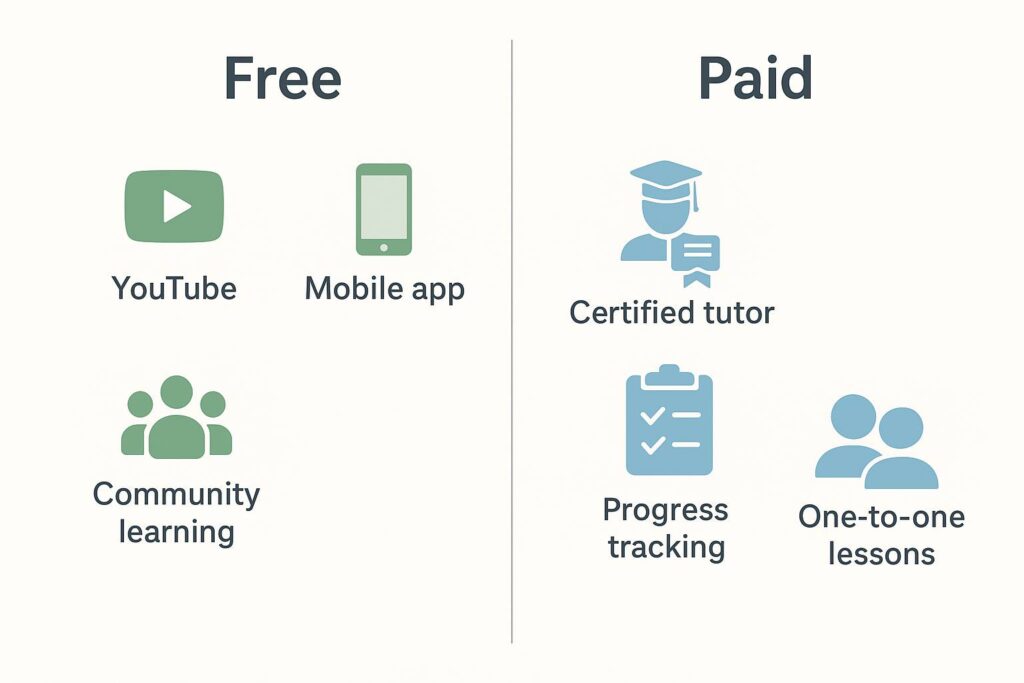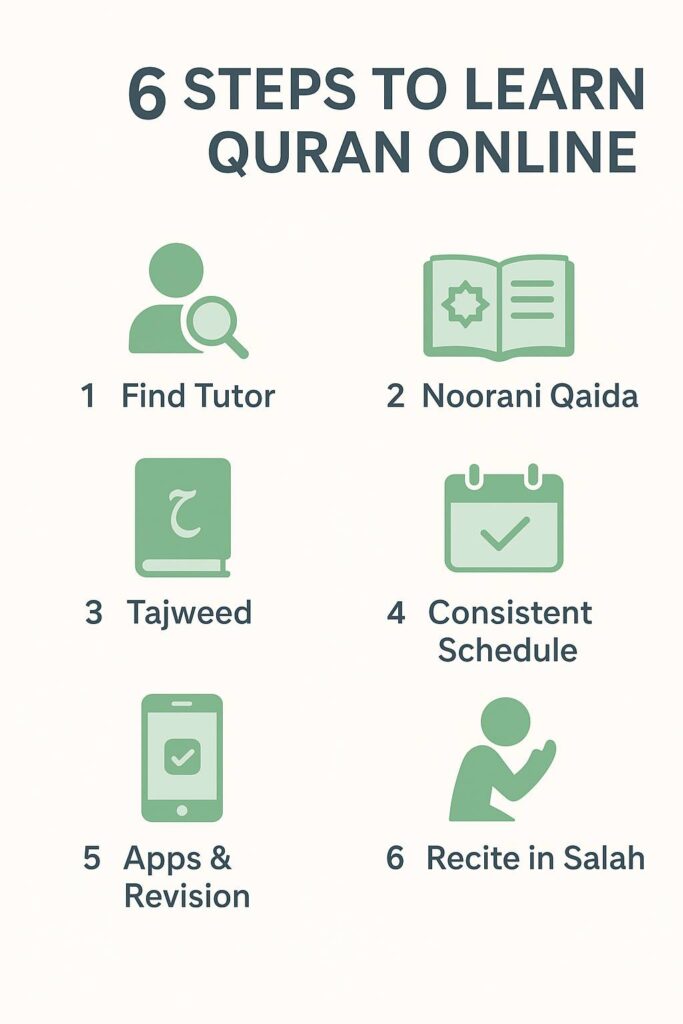For centuries, Muslims have learned the Quran through local madrasas and trusted teachers. That traditional method still holds great value, but let’s be honest – modern life makes it hard for many people to attend classes regularly. With work, family, and travel, it’s no surprise that regular madrasa visits aren’t possible for many. That’s why so many people now prefer learning the Quran online – it’s flexible, affordable, and easy to access from anywhere.
By 2025, online Quran learning has become even more advanced. There are global platforms offering interactive lessons, certified tutors, and personalised programmes for learners of all ages. Whether you’re a professional with limited time, a parent looking for structured classes for your child, or a beginner starting from Noorani Qaida, there’s an option out there for you. With one-to-one tutoring, digital resources, and the ability to connect from anywhere, Quran education has truly become borderless.
Why Learning the Quran Online is the Best Way Today
Learning the Quran has always been central to Muslim life, but the way we approach it is changing fast. Let’s be real — with busy jobs, school runs, and family responsibilities, sitting in a madrasa every day just isn’t possible for many people anymore. That’s exactly why so many have turned to online learning, and for good reason.
The biggest advantage is flexibility. Whether it’s after work, before Fajr, or on a quiet Sunday, online classes adjust to your routine instead of forcing you to adjust to them.
Another point parents often mention is access to teachers. In the past, you were limited to whoever lived nearby. Now, you can learn from a certified tutor in Egypt, Pakistan, or the UK without leaving your living room.
And perhaps the best part – online learning lets you move at your own pace. A child starting Noorani Qaida doesn’t feel rushed, while an adult polishing Tajweed or memorising Quran isn’t held back by a group. It’s personalised in a way that most physical classrooms can’t match.
Free vs Paid Quran Learning Websites

A lot of people type into Google: “best website to learn Quran online free.” And honestly, you can find quite a few. YouTube channels, free mobile apps, even community-run websites. They’re great if you just want to pick up the alphabet or try a few Tajweed lessons without committing. I’ve even seen parents start their kids off with an app before moving to proper classes — it works fine as an introduction.
But here’s the catch: free stuff only takes you so far. There’s no teacher correcting you when you mix up similar letters, and no one checking if you’re actually keeping up. It feels good for a week or two, then motivation fades. I’ve lost count of how many people say, “I started with YouTube, but I never finished.”
That’s where paid platforms step in. Yes, you’re paying monthly, but in return you get live tutors, proper lesson plans, and feedback. The difference is night and day.If your goal is Tajweed or Hifz, structure matters. It’s a bit like fitness – you can follow free videos, but a real trainer keeps you motivated and on track.
So, free is fine for dipping your toes in. But if you really want to stay the course and see progress, investing in a tutor makes the journey smoother – and faster.
Best Online Platforms & Tutors for Personalised Learning
One of the real advantages of learning online is that you’re not stuck with whoever happens to be local. You can actually choose a tutor who matches your pace and personality. And that small change can completely transform the way you learn.
In a one-to-one class, the focus is fully on you. The tutor listens carefully to your recitation, notices mistakes you don’t even realise, and corrects them on the spot. It might feel slow at first, but it prevents bad habits that become much harder to fix later.
Another benefit is flexibility. A kid starting Noorani Qaida can go slowly, repeating until it sticks, while an adult working on memorisation can move much faster. The pace isn’t forced—it’s built around you.
And honestly, sometimes it’s just about having someone who motivates you. When you know your teacher is going to ask, “Did you practise yesterday?” you don’t want to show up empty-handed. That accountability keeps people going, especially with Hifz where daily revision is everything.
If you’re choosing a tutor, look for someone certified in Tajweed or Hifz, not just someone who can read. The right teacher turns online learning from “just reading” into building a proper, confident connection with the Quran.
The Best Steps To Learn Quran Online (Practical Guide)

If you’re starting out with online Quran lessons, it can feel a bit confusing. There are hundreds of apps and websites, but where do you actually begin? The good news is, once you break it down step by step, starting online Quran learning is actually quite simple.
Step 1: Find a Good Teacher or Platform
Not every online tutor is the same. Take a trial class, ask about their experience, and see if you’re comfortable with their style. A teacher who explains clearly will save you a lot of frustration.
Step 2: Start with Noorani Qaida
Every student, child or adult, should begin here. Qaida teaches the Arabic letters, their sounds, and how words are formed. Without it, Tajweed will feel ten times harder.
Step 3: Make Tajweed a Priority
Don’t wait until later. From day one, focus on proper pronunciation. It’s easier to learn correctly than to fix mistakes years down the road.
Step 4: Keep Lessons Short but Regular
Twenty minutes daily is better than two hours once a week. Progress happens with consistency, not cramming.
Step 5: Use Apps and Digital Mushaf
Listen to recitations, revise on your phone, and read a little outside of class. Tech makes it easier to stay connected to your lessons.
Step 6: Recite in Salah
The best practice is during prayer. It strengthens memory and makes your Salah more meaningful.
Best Online Quran Learning in the UK
The UK has a big Muslim community, and honestly, life here can get really busy. Between school runs, work shifts, and family stuff, a lot of people just don’t have time to drive to a madrasa a few times a week. That’s why online Quran classes have become such a go-to option. You log in, take your lesson, and you’re done — no buses, no rushing.
One thing that makes it easier in the UK is the timing. Most platforms now offer tutors who adjust to UK hours, so kids can study after school and adults can learn in the evenings. A lot of parents like the fact that they can also choose between male or female teachers, depending on what feels comfortable.
Another big difference is structure. In many weekend madrasas, you don’t always get detailed feedback. Online platforms usually give progress reports, track what you’ve learned, and set small goals. Parents can actually see if their child is moving forward, and adults know where they stand too.
So whether it’s a child starting Noorani Qaida or someone older working on Tajweed, the best online Quran learning in the UK feels more practical and, to be honest, more motivating. It fits around daily life instead of clashing with it.
Best Online Quran Learning Classes in the UK
In the UK, most learners end up choosing between one-to-one lessons or small group sessions. Both work well — the right choice depends on whether you or your child need personal focus or a more social, interactive setting.
One-to-one classes are ideal if you prefer full attention. The tutor focuses entirely on you, correcting mistakes instantly and adapting lessons to your pace.A lot of adults doing Hifz or serious Tajweed prefer this because it’s faster and more personal.
Group classes work well for kids and beginners. They’re cheaper, a bit more fun, and children especially enjoy seeing others learning alongside them. It creates a little sense of community, which can help them stay motivated.
And just to mention — some people even type “best online Quran learning classes UK” when searching. It’s just a misspelling, but it points to the same thing. The main idea is finding a structured programme with good tutors and flexible timings.
For families and individuals in the UK, these online classes make it much easier to balance faith and everyday life. You don’t have to choose between school, work, or Quran — you can manage all of them together.
Conclusion
At the end of the day, the best way to learn Quran online is the one that fits into your lifestyle. With flexible timings, access to tutors worldwide, and lessons that adjust to your speed, online learning makes the process easier than ever.
If you’re a beginner, start small with Noorani Qaida. Parents can find kid-friendly classes, and adults can focus on Tajweed or even Hifz if that’s their goal. What matters most is finding a teacher and routine that you can stick to.
Learning the Quran isn’t about rushing through lessons or ticking off chapters. It’s about nurturing a lasting connection with Allah’s book that grows stronger over time.
FAQ:
Most people start with Noorani Qaida. It’s the ABCs of Arabic. Once you’ve got that down, you move to Tajweed. The key is short, regular lessons — not cramming.
Yes, many do. There are free apps, YouTube videos, and websites. They’re fine for basics, but without a teacher mistakes stick. Paid classes usually work better.
Depends on you. Some beginners manage Tajweed in 6–12 months. Hifz takes years of steady work. No shortcuts, just routine.
For focus, yes. For budget and interaction, groups are good. Kids usually like groups, adults often prefer one-to-one.



